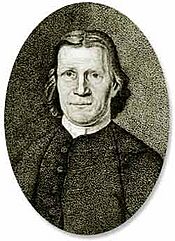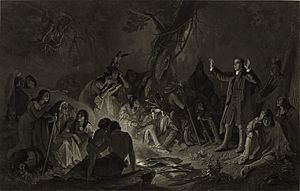David Zeisberger facts for kids
Quick facts for kids
David Zeisberger
|
|
|---|---|

A caption on the print states that it is "From a portrait painted at the age of forty."
|
|
| Born | April 11, 1721 Zauchtenthal, Moravia (present day Suchdol nad Odrou, Czech Republic)
|
| Died | November 17, 1808 (aged 87) |
| Occupation | Missionary, Clergyman, translator |
| Spouse(s) | Susanna Lecron |
| Parent(s) | David Zeisberger Rosina Zeisberger |
David Zeisberger (born April 11, 1721 – died November 17, 1808) was a special kind of Christian leader called a missionary. He was part of the Moravian Church. Zeisberger spent most of his life working with Native American tribes who lived in the Thirteen Colonies (which later became part of the United States).
He helped Native Americans, especially the Munsee (Lenape) people, who chose to become Christians. He helped them build new communities in places like the Muskingum River valley in Ohio. He also helped them for a time near Amherstburg, Ontario, in Canada.
Contents
David Zeisberger's Early Life
David Zeisberger was born in a place called Zauchtenthal, which is now Suchdol nad Odrou in the Czech Republic. When he was six years old, his family moved to a new Christian community. This community was called Herrnhut in Germany.
However, David stayed in Europe to finish his schooling when his family moved to the new colony of Georgia in America. In 1738, he finally came to Georgia. He got help from the governor, James Oglethorpe. Later, he joined his family in a Moravian community in Savannah, Georgia.
Starting New Communities
From Georgia, David moved to Pennsylvania. He helped start new Moravian settlements there. These included the towns of Nazareth and Bethlehem.
In 1739, Zeisberger played a big part in building the Moravian community in Bethlehem, Pennsylvania. He was there when it was officially opened on Christmas Eve in 1741.
Learning Native American Languages
Four years later, a Native American leader named Hendrick Theyanoguin invited David to live among the Mohawk people. David learned to speak the Onondaga language very well. He even helped make a peace agreement between the Thirteen Colonies and the Iroquois people. This meeting happened in a village called Onondaga, near what is now Syracuse, New York.
Zeisberger also wrote dictionaries and religious books in Native American languages. These included Iroquoian and Algonquian languages. Because of his work, he is known as the "father of Lenape writing."
Zeisberger's Missionary Work
David Zeisberger became a Moravian minister in 1749. After this, he started his work as a missionary to Native American peoples. He worked in a place called Kuskusky among the Lenape (Delaware) people in Pennsylvania. His main goal was to help as many Native Americans as possible become Christians.
He was the most important missionary for the Moravian Church among the Native Americans. He spent 62 years of his life as a missionary, with only a few short breaks.
Challenges During the American Revolution
During the American Revolutionary War, Zeisberger's relationship with the British became difficult. The British thought he might be helping the American patriots. In 1781, he was arrested and held at Fort Detroit.
While he was held captive, a terrible event happened. Ninety-six of his Native American converts in Gnadenhutten, Ohio, were killed by Pennsylvania militiamen. This sad event is known as the Gnadenhutten Massacre.
Later Years and Legacy
After David Zeisberger was set free, his Christian Native American communities faced more problems. There were conflicts with other Native tribes and more white settlers moving into the area. This forced many Moravian Christian settlements to move to places like Michigan and Ontario.
A large group of Munsee people moved there in 1782. However, Zeisberger later returned to live the rest of his life with the Native American converts who stayed near the village of Goshen. This village is in present-day Goshen Township, Tuscarawas County, Ohio.
David Zeisberger passed away on November 17, 1808, in Goshen, Ohio. He was 87 years old. He is buried in Goshen, where he spent his final years.
Images for kids
 | William L. Dawson |
 | W. E. B. Du Bois |
 | Harry Belafonte |



